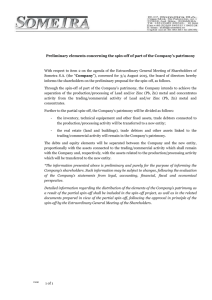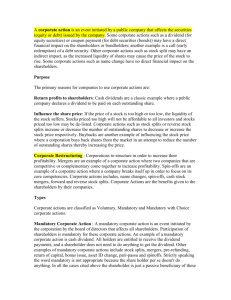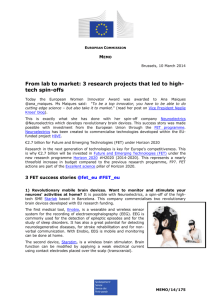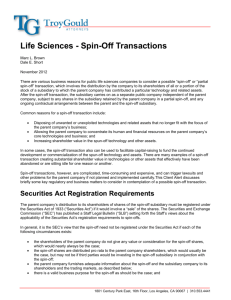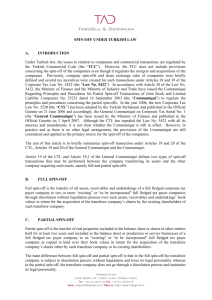Internal Memorandum
advertisement
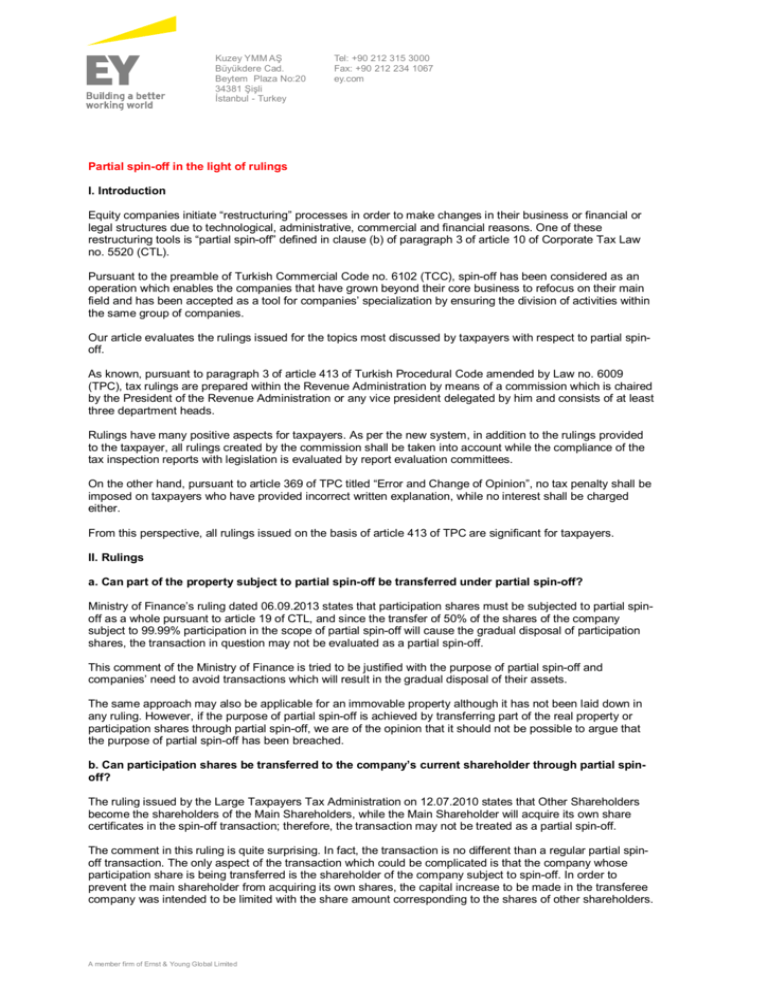
Kuzey YMM AŞ Büyükdere Cad. Beytem Plaza No:20 34381 Şişli İstanbul - Turkey Tel: +90 212 315 3000 Fax: +90 212 234 1067 ey.com Partial spin-off in the light of rulings I. Introduction Equity companies initiate “restructuring” processes in order to make changes in their business or financial or legal structures due to technological, administrative, commercial and financial reasons. One of these restructuring tools is “partial spin-off” defined in clause (b) of paragraph 3 of article 10 of Corporate Tax Law no. 5520 (CTL). Pursuant to the preamble of Turkish Commercial Code no. 6102 (TCC), spin-off has been considered as an operation which enables the companies that have grown beyond their core business to refocus on their main field and has been accepted as a tool for companies’ specialization by ensuring the division of activities within the same group of companies. Our article evaluates the rulings issued for the topics most discussed by taxpayers with respect to partial spinoff. As known, pursuant to paragraph 3 of article 413 of Turkish Procedural Code amended by Law no. 6009 (TPC), tax rulings are prepared within the Revenue Administration by means of a commission which is chaired by the President of the Revenue Administration or any vice president delegated by him and consists of at least three department heads. Rulings have many positive aspects for taxpayers. As per the new system, in addition to the rulings provided to the taxpayer, all rulings created by the commission shall be taken into account while the compliance of the tax inspection reports with legislation is evaluated by report evaluation committees. On the other hand, pursuant to article 369 of TPC titled “Error and Change of Opinion”, no tax penalty shall be imposed on taxpayers who have provided incorrect written explanation, while no interest shall be charged either. From this perspective, all rulings issued on the basis of article 413 of TPC are significant for taxpayers. II. Rulings a. Can part of the property subject to partial spin-off be transferred under partial spin-off? Ministry of Finance’s ruling dated 06.09.2013 states that participation shares must be subjected to partial spinoff as a whole pursuant to article 19 of CTL, and since the transfer of 50% of the shares of the company subject to 99.99% participation in the scope of partial spin-off will cause the gradual disposal of participation shares, the transaction in question may not be evaluated as a partial spin-off. This comment of the Ministry of Finance is tried to be justified with the purpose of partial spin-off and companies’ need to avoid transactions which will result in the gradual disposal of their assets. The same approach may also be applicable for an immovable property although it has not been laid down in any ruling. However, if the purpose of partial spin-off is achieved by transferring part of the real property or participation shares through partial spin-off, we are of the opinion that it should not be possible to argue that the purpose of partial spin-off has been breached. b. Can participation shares be transferred to the company’s current shareholder through partial spinoff? The ruling issued by the Large Taxpayers Tax Administration on 12.07.2010 states that Other Shareholders become the shareholders of the Main Shareholders, while the Main Shareholder will acquire its own share certificates in the spin-off transaction; therefore, the transaction may not be treated as a partial spin-off. The comment in this ruling is quite surprising. In fact, the transaction is no different than a regular partial spinoff transaction. The only aspect of the transaction which could be complicated is that the company whose participation share is being transferred is the shareholder of the company subject to spin-off. In order to prevent the main shareholder from acquiring its own shares, the capital increase to be made in the transferee company was intended to be limited with the share amount corresponding to the shares of other shareholders. A member firm of Ernst & Young Global Limited We think that the limitation should not constitute an obstacle for the transaction to be conducted, and without consideration of the exemption provisions of TCC no 6762 regarding companies’ acquisition of their own shares, it is not possible to conclude that the transaction is not a partial spin-off simply because it causes the main shareholder to acquire its own shares. c. Will taxation be applied due to capital reduction in case the company subject to spin-off makes capital reduction and the capital contains taxable items? The ruling issued by the Ministry of Finance on 20.07.2012 contains the following comments; - In case the company’s capital is reduced because the share certificates received from the company where capital in kind is contributed are given to shareholders as a result of partial spin-off and there are also inflation adjustment difference accounts and previous years’ profits which were previously added to capital; provided that the inflation adjustment difference accounts and previous years’ profits are also included as an element of capital and are separately seen in the capital increase to be made in the transferee company, this transaction may not be considered as withdrawal from the enterprise and shall not be taxed, - However, in case the inflation differences and previous years’ losses which are an element of capital in the transferee company are transferred to another account in the transferee company or withdrawn from the enterprise or capital reduction is applied, the amounts withdrawn from the enterprise in relation with inflation differences must be primarily subjected to corporate tax without being associated with the profit of the period of withdrawal, and the distributed profit after tax must be subjected to dividend withholding tax, while the amounts related to previous years’ profits must be also be subjected to dividend withholding tax. This is an accurate approach since the positive inflation adjustment difference or participation share or the amounts in the fund account due to the return on sale of real property will be exactly transferred to the balance sheet of newly established or existing companies upon partial spin-off and the exemption will be exactly maintained in the transferee company. III. Conclusion Uncertainties arising during the implementation of partial spin-off should be evaluated by taking into account the function and purposes of partial spin-off. It should be always remembered that partial spin-off is a restructuring tool. Each case should be examined with concrete data in itself and evaluated together with all rules in our legislation while forming an opinion on the matter. Therefore, while requesting ruling, it is very important to clearly present the data on the issue and legislation in order to derive the correct result expected from the ruling. Explanations in this article reflect the writer's personal view on the matter. EY and/or Kuzey Yeminli Mali Müşavirlik A.Ş. disclaim any responsibility in respect of the information and explanations in the article. Please be advised to first receive professional assistance from the related experts before initiating an application regarding a specific matter, since the legislation is changed frequently and is open to different interpretations. A member firm of Ernst & Young Global Limited
